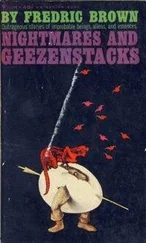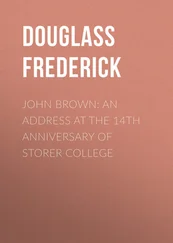Fredrick Brown - Night of the Jabberwock
Здесь есть возможность читать онлайн «Fredrick Brown - Night of the Jabberwock» весь текст электронной книги совершенно бесплатно (целиком полную версию без сокращений). В некоторых случаях можно слушать аудио, скачать через торрент в формате fb2 и присутствует краткое содержание. Жанр: Фэнтези, на английском языке. Описание произведения, (предисловие) а так же отзывы посетителей доступны на портале библиотеки ЛибКат.
- Название:Night of the Jabberwock
- Автор:
- Жанр:
- Год:неизвестен
- ISBN:нет данных
- Рейтинг книги:4 / 5. Голосов: 1
-
Избранное:Добавить в избранное
- Отзывы:
-
Ваша оценка:
- 80
- 1
- 2
- 3
- 4
- 5
Night of the Jabberwock: краткое содержание, описание и аннотация
Предлагаем к чтению аннотацию, описание, краткое содержание или предисловие (зависит от того, что написал сам автор книги «Night of the Jabberwock»). Если вы не нашли необходимую информацию о книге — напишите в комментариях, мы постараемся отыскать её.
Night of the Jabberwock — читать онлайн бесплатно полную книгу (весь текст) целиком
Ниже представлен текст книги, разбитый по страницам. Система сохранения места последней прочитанной страницы, позволяет с удобством читать онлайн бесплатно книгу «Night of the Jabberwock», без необходимости каждый раз заново искать на чём Вы остановились. Поставьте закладку, и сможете в любой момент перейти на страницу, на которой закончили чтение.
Интервал:
Закладка:
"Smiley," I said, "if that's not the first profound thing you've said, it's the most profound. You are right, moreover. You have my full permission to leave the calendar up."
He laughed and moved along the bar to finish wiping glasses, and I stood there and wondered why I didn't go on home. It was still early, a few minutes before eight o'clock. I didn't want another drink, yet. But by the time I got home, I would want one.
So I got out my wallet and called Smiley back. We estimated how many drinks I'd poured out of the bottle and I settled for them, and then I bought another bottle, a full quart, and he wrapped it for me.
I went out with it under my arm and said "So long, Smiley," and he said "So long, Doc," just as casually as though, before the gibbering night that hadn't started yet was over, he and I would not — but let's take things as they happened.
The walk home.
I had to go past the post office anyway, so I stopped in. The mail windows were closed, of course, but the outer lobby is always left open evenings so those who have post office boxes can get mail out of them.
I got my mail — there wasn't anything important in it — and then stopped, as I usually do, by the bulletin board to look over the notices and the wanted circulars that were posted there.
There were a couple of new ones and I read them and studied the pictures. I've got a good memory for faces, even ones I've just seen pictures of, and I'd always hoped that some day I'd spot a wanted criminal in Carmel City and get a story out of it, if not a reward.
A few doors farther on I passed the bank and that reminded me about its president, Clyde Andrews, and his wanting to buy the paper from me. He didn't want to run it himself, of course; he had a brother somewhere in Ohio who'd had newspaper experience and who would run the paper for Andrews if I sold it to him.
The thing I liked least about the idea, I decided, was that Andrews was in politics and, if he controlled the Clarion, the Clarion would back his party. The way I ran it, it threw mud at both factions when they deserved it, which was often, and handed either one an occasional bouquet when deserved, which was seldom. Maybe I'm crazy — other people than Smiley and Al have said so — but that's the way I think a newspaper should be run, and especially when it's the only paper in a town.
It's not, I might mention, the best way to make money. It had made me plenty of friends and subscribers, but a newspaper doesn't make money from its subscribers. It makes money from advertisers and most of the men in town big enough to be advertisers had fingers in politics and no matter which party I slammed I was likely to lose another advertising account.
I'm afraid that policy didn't help my news coverage, either. The best source of news is the sheriff's department — and, at the moment, Sheriff Rance Kates was just about my worst enemy. Kates is honest, but he is also stupid, rude and full of race prejudice; and race prejudice, although it's not a burning issue in Carmel City, is one of my pet peeves. I hadn't pulled any punches in my editorials about Kates, either before or after his election. He got into office only because his opponent — who wasn't any intellectual heavyweight either — had got into a tavern brawl in Neilsville a week before election and was arrested there and charged with assault and battery. The Clarion had reported that, too, so the Clarion was probably responsible for Rance Kates' being elected sheriff. But Rance remembered only the things I'd said about him, and barely spoke to me on the street. Which, I might add, didn't concern me the slightest bit personally, but it forced me to get all of my police news, such as it is, the hard way.
Past the supermarket and Beal Brothers and past Deak's Music Store — where I'd once bought a violin but had forgotten to get a set of instructions with it — and the corner and across the street.
The walk home.
Maybe I weaved just a little, for at just that stage I'm never quite as sober as I am later on. But my mind — ah, it was in that delightful state of being crystal clear in the center and fuzzy around the edges, the state that every moderate drinker knows but can't explain or define, the state that makes even a Carmel City seem delightful and such things as its squalid politics amusing.
Past the comer drugstore — Pop Hinkle's place — where I used to drink sodas when I was a kid, before I went away to college and made the big mistake of studying journalism. Past Gorham's Feed Store, where I'd worked vacations while I was in high school. Past the Bijou Theater. Past Hank Greeber's Undertaking Parlors, through which both of my parents had passed, fifteen and twenty years ago.
Around the corner at the courthouse, where a light was still on in Sheriff Kates' office — and I felt so cheerful that, for a thousand dollars or so, I'd have stopped in to talk to him. But no one was around to offer me a thousand dollars.
Out of the store district now, past the house in which Elsie Minton had lived — and in which she had died while we were engaged, twenty-five years ago.
Past the house Elmer Conklin had lived in when I'd bought the Clarion from him. Past the church where I'd been sent to Sunday School when I was a kid, and where I'd once won a prize for memorizing verses of the Bible.
Past my past, and walking, slightly weaving, toward the house in which I'd been conceived and born.
No, I hadn't lived there fifty-three years. My parents had sold it and had moved to a bigger house when I was nine and when my sister — now married and living in Florida — had been born. I'd bought it back twelve years ago when it happened to be vacant and on the market at a good price. It's only a three-room cottage, not too big for a man to live in alone, if he likes to live alone, and I do.
Oh, I like people, too. I like someone to drop in for conversation or chess or a drink or all three. I like to spend an hour or two in Smiley's, or any other tavern, a few times a week. I like an occasional poker game.
But I'll settle, on any given evening, for my books. Two walls of my living room are lined with them and they overflow into bookcases in my bedroom and I even have a shelf of them in the bathroom. What do I mean, even? I think a bathroom without a bookshelf is as incomplete as would be one without a toilet.
And they're good books, too. No, I wouldn't be lonely tonight, even if Al Grainger didn't come around for that game of chess. How could I be lonesome with a bottle in my pocket and good company waiting for me? Why, reading a book is almost as good as listening to the man who wrote it talking to you. Better, in one way, because you don't have to be polite to him. You can shut him up any moment you feel so inclined and pick someone else instead. And you can take off your shoes and put your feet on the table. You can drink and read until you forget everything but what you're reading; you can forget who you are and the fact that there's a newspaper that hangs around your neck like a millstone, all day and every day, until you get home to sanctuary and forgetfulness.
The walk home.
And so to the corner of Campbell Street and my turning.
A June evening, but cool, and the night air had almost completely sobered me in the nine blocks I'd walked from Smiley's.
My turning, and I saw that the light was on in the front room of my house. I started walking a little faster, mildly puzzled. I knew I hadn't left it on when I'd left for the office that morning. And if I had left it on, Mrs. Carr, the cleaning woman who comes in for about two hours every afternoon to keep my place in order, would have turned it off.
Maybe, I thought, Al Grainger had finished whatever he was doing and had come early and had — but no, Al wouldn't have come without his car and there wasn't any car parked in front.
Читать дальшеИнтервал:
Закладка:
Похожие книги на «Night of the Jabberwock»
Представляем Вашему вниманию похожие книги на «Night of the Jabberwock» списком для выбора. Мы отобрали схожую по названию и смыслу литературу в надежде предоставить читателям больше вариантов отыскать новые, интересные, ещё непрочитанные произведения.
Обсуждение, отзывы о книге «Night of the Jabberwock» и просто собственные мнения читателей. Оставьте ваши комментарии, напишите, что Вы думаете о произведении, его смысле или главных героях. Укажите что конкретно понравилось, а что нет, и почему Вы так считаете.












